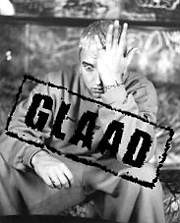GLAAD—short for Gay & Lesbian Alliance Against Defamation—is the media watchdog for what is awkwardly referred to as the Lesbian/Gay/Bisexual/Transgender (LGBT) community. Two weeks ago, GLAAD issued a “media alert” about Eminem, noting that his new The Marshall Mathers LP is rife with lyrics “soaked with violence and full of negative comments about many groups, including lesbians and gay men.”
A sampling of the white Detroit rapper’s rhymes followed, including Eminem’s lame swipe at murdered designer Gianni Versace. GLAAD also singled out this bit of poetry: “My words are like a dagger with a jagged edge/That’ll stab you in the head whether you’re a fag or les/Or the homosex, hermaph or a trans-a-ves/Pants or dress/Hate fags? The answer’s yes. . . .”
The statement went on to note that, “while Eminem certainly has the freedom of speech to rap whatever he wants,” it is “irresponsible” of his record company to “produce and promote such defamatory material that encourages violence and hatred. This is especially negligent when considering the market for this music has been shown to be adolescent males, the very group that statistically commits the most hate crimes.”
The group called upon Eminem’s label, Interscope, to consider the consequences of unleashing such material on the marketplace. “Holding the LGBT community up as a target for abuse is unnecessary to sell records,” it concluded. “Let Eminem know how such disregard for others can lead to discrimination, physical abuse, and even death.”
My first reaction after reading this was to roll my eyes. Political correctness rubs me the wrong way. It’s not that I get a kick out of being verbally (or physically) bashed around by straight people, but many aspects of life as a gay man strike me as inherently funny—like the fact that LGBT sounds like short-order lingo for a club sandwich. I want to feel free to lampoon my lifestyle without fear of a mob of torch-waving queers led by Chastity Bono or Alexis Arquette showing up on my doorstep. Plus, I kind of like Eminem’s clipped beats and whiny, nasal delivery.
But my full-time job, writing music news copy for a Web site, dictated that I couldn’t disregard the GLAAD statement. The Marshall Mathers LP sold over 1.76 million copies that same week (its first in stores), setting new records. It moved 450,000 more copies than the new Britney Spears album, Oops! . . . I Did It Again had the week before. Eminem was now second only to ‘N Sync (who he disses on his new disc) in the history books for highest number of units sold in the first week of release.
So I wrote a short item, paraphrasing most of the information above. And then I wrapped up with the following sentence: “In the past, Eminem has said that his lyrics—which of late seem awfully preoccupied with oral sex and teenage boy bands—shouldn’t be taken as gospel, and that he isn’t homophobic.”
This is my standard response when dealing with artists accused of anti-LGBT sentiments: Isolate a locker room-level lyric, and turn it around to poke fun at them. (I did the same thing after Fred Durst from Limp Bizkit, responding to accusations of lyrical gay bashing in “All in the Family,” his duet with Jonathan Davis of Korn, told me half of his friends are gay.) Eminem has said on MTV that while homosexuality isn’t his cup of tea, he doesn’t have a problem with my tribe per se. And I want to believe him, probably because the other option—acknowledging that a wildly popular musician I like wishes me bodily harm—is too unsettling.
But the day after writing my unattributed Eminem story, I received a note from an enraged fan. “I would just like to extend a virtual middle finger to the writer of the article posted on your site. Whoever wrote that piece of trash obviously, for one reason or another, identifies with the fag . . . uh . . . I mean . . . homosexual community.” Talk about a wake-up call. Here was great evidence supporting GLAAD’s concern that lyrics like the ones found on The Marshall Mathers LP lend credence to the belief that expressing homophobic sentiments is acceptable.
So I have a proposed solution for artists who want to say one thing on their records and something else on-the-record. Many rap albums are now available with or without objectionable words, the latter being so-called “clean” CD editions. Let’s do the same thing with acts that want to express homophobic (or racist or sexist) opinions. Only instead of just bleeping out the offensive reference, a queer-friendly alternative lyric will be inserted. Every time Eminem, Limp Bizkit, or Korn feel the need to bust a rhyme about fag bashing, they also have to record a version of the song where they’re playing “lucky Pierre” between Ben Affleck and Matt Damon. That way, they can represent all the positions . . . uh . . . I mean . . . viewpoints, they claim to hold. Any objections?






